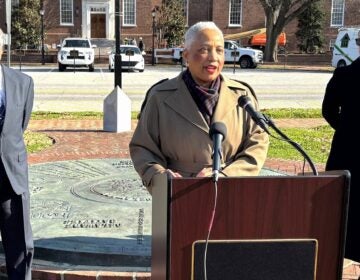DNREC approves Delaware City refinery to ship ethanol

(File/WHYY)
Delaware’s Department of Natural Resources and Environmental Control has approved a Delaware City Refinery Company project that will allow it to receive and store unblended ethanol and transfer it by barge between its Delaware City docking facility and other locations on the East Coast.
The refinery, owned by PBF Energy, submitted an application for a Coastal Zone Act permit in August, asking approval for the $7 million project to expand its current capabilities to ship up to 10,000 barrels of ethanol per day.
The project came under fire from environmentalists, who argued the project would violate Coastal Zone Act laws, which prohibit bulk product transfer operations.
Refineries that existed before the Act passed in 1971, including the one in Delaware City, were grandfathered in, but were required to receive a permit before making additional expansions.
The Delaware City refinery argued its project doesn’t violate the Act because it already receives shipments of ethanol at its facility and the project doesn’t require major modifications. The refinery also insisted it didn’t require a permit for the project.
DNREC has since concluded that the refinery does in fact require a permit for the project. However, the department disagrees with opponents of the plan that the refinery would break CZA laws by completing the project. On Wednesday, Secretary David Small approved the refinery for a CZA permit.
“As we reviewed the record and the historical decision the agency has made it became clear to us the permit application was approvable,” he said.
“If a facility wants to expand the use of the facility, it can do so, but it has to get a permit from the department. We see this as expanding that use rather than creating a new bulk product transfer facility.”
The permit requires the refinery to mitigate any negative impact to the environment. The project would create new emissions of about a ton or less, Small said. He said the refinery has agreed to install pollution control technology—that equipment must be approved by a separate air permit and installation is required prior to the moving of ethanol.
A spokesperson for the refinery said in an email; “PBF is pleased DNREC Secretary David Small has issued a Coastal Zone Act permit for our “Ethanol Marketing Project,” which will help Delaware City Refinery become more competitive. We look forward to advancing the project next year.”
The project is one of two issues the refinery is currently facing. On Friday, DNREC issued a violation notification to the refinery for transporting crude oil beyond its limitation restrictions.
The DNREC violation notification states in 2013 it issued an ordinance to the company allowing it to transfer crude oil only to a location in Paulsboro, NJ—but that it violated that ordinance by since transporting material to other locations.
In 2015, DNREC learned the company shipped to a location other than Paulsboro, after an anonymous source tipped off the Delaware Department of Justice.
Refinery representatives met with DNREC and the state DOJ in November 2015 to discuss the incident, and stated the delivery was a “one-time shipment to an alternative facility due to an unanticipated logistical irregularity regarding the movement of crude oil,” according to the violation notification.
DNREC let the “one-time” occurrence pass. However, after the company recently admitted to other incidents of crude oil transportation. DNREC is now requiring the refinery to provide any documentation of its dealings with the shipment of crude oil within 30 days. The violation notification states DNREC currently is not assessing penalties, but reserves the right to take further enforcement.
Environmentalists have argued allowing the company to transport to Paulsboro defies the CZA, which puts restrictions on bulk shipments bordering Delaware’s shoreline.
Small said Wednesday’s permit approval will not affect the department’s consideration of the violation.
“We see these as separate issues, and that is a pending enforcement action and it will be dealt with under the rules that apply and context and facts that apply with that case which is separate from this decision,” he said.
WHYY is your source for fact-based, in-depth journalism and information. As a nonprofit organization, we rely on financial support from readers like you. Please give today.





